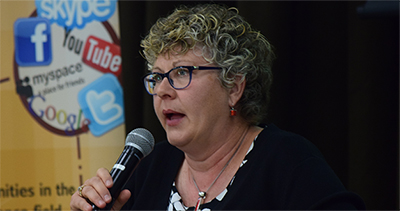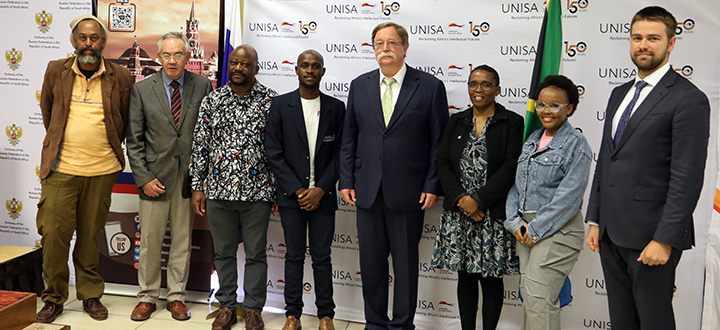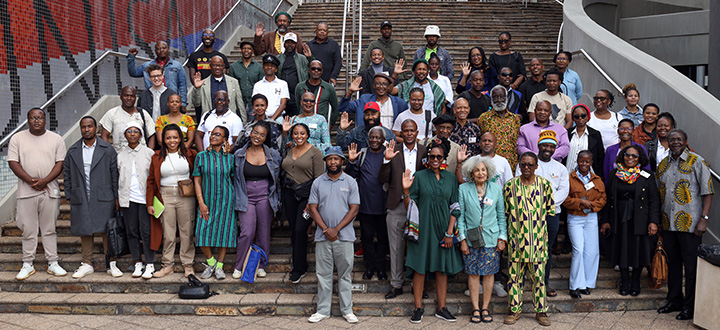College of Human Sciences
Taking a stand in the post-truth era
 The Department of Information Sciences in the College of Human Sciences hosted their first annual Information Science Guest Lecture delivered by Professor Heidi Julien, chair of the Department of Library and Information studies at the University of Buffalo in New York.
The Department of Information Sciences in the College of Human Sciences hosted their first annual Information Science Guest Lecture delivered by Professor Heidi Julien, chair of the Department of Library and Information studies at the University of Buffalo in New York.
This lecture was organised under the theme, Situating the information professional and researcher in the post truth era. The respondent to the keynote address was former Unisan and current Head of Department of Information Science and Chairperson of the School of Information Technology at the University of Pretoria, Professor Archie Dick.
According to Professor Julien, we are currently living in a world where we are surrounded by misinformation, propaganda and unreliable digital reporting. She said it is important for us to face the fact that all of this is happening in a climate of anti-intellectualism and a refusal to recognise expertise.
She said we are going through an era of declining trust in the media, where most people have greater trust in print than in digital media. She painted a bleak picture when presenting digital data that was collected from Facebook news posts on election stories during the campaigning period in the US, with evidence revealing that engagement with fake news rose very sharply. Her presentation confirmed that the more overly misleading and opinion driven a post was, there more engagement it received.
Professor Julien said that this growth in polarisation of followers posed a great crisis for state governance, because she believes that good governance and democracy functions when accurate information is readily available for the society. She highlighted that it is again a major crisis for success in academia because students who come to universities, come already with great difficulty of discerning fake information from accurate information, for their decision making.
It is Professor Julien’s opinion that digital illiteracy is a major challenge faced by society today. She said challenges such as people overestimating the level of their digital literacy skills, their disregard for the context of information, habit and convenience on information seeking behaviour, are some of the reasons for the digital illiteracy.
Professor Julien added that there is also the challenge of confirmation bias, where people only embrace information that supports their beliefs and reject contradictory information. She mentioned that there is research that showed people experience a dopamine rush when they consume information that supports their belief, which proved that there is physical response to that effect.
She said in her 20 years of research, she came to learn that digital literacy instruction at college and university level is often poorly resourced, limited, often done unsystematically and often badly implemented, all of which renders it ineffective. She suggested that experts should assert their expertise and train information professionals on how to teach digital literacy skills at the level of their profession; and she said this training will have to include; basic digital literacy concepts, needs assessments, instructional strategies, learning theory, instructional design, gamification, differentiated instruction, programme planning, implementation, assessment and evaluation; as a programme.
* By Katlego Pilane
Publish date: 2018-09-18 00:00:00.0

 Unisa's student leadership engage with Russian ambassador
Unisa's student leadership engage with Russian ambassador
 Re-igniting and re-imagining Pan Africanism, Afrocentricity and Afrofuturism in the 21st century
Re-igniting and re-imagining Pan Africanism, Afrocentricity and Afrofuturism in the 21st century
 Young Unisa science stars join elite Lindau Nobel Laureate group
Young Unisa science stars join elite Lindau Nobel Laureate group
 Education MEC addresses Unisa autism seminar
Education MEC addresses Unisa autism seminar
 Seven Unisans nominated for the NSTF-South32 Awards 2023/2024
Seven Unisans nominated for the NSTF-South32 Awards 2023/2024